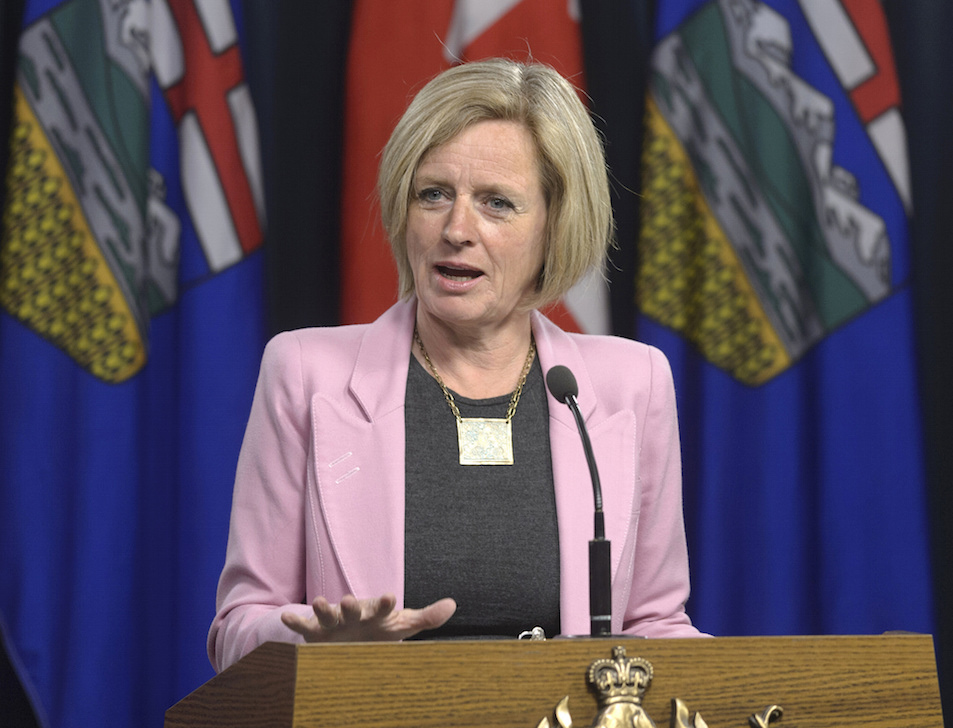Rachel Notley, Alberta’s tough NDP premier who has clearly concluded her government’s survival depends on there being shovels in the ground building a pipeline by the time she asks the lieutenant governor to call an election next year, rolls the dice a lot like Brian Mulroney.
Well, not exactly like Mr. Mulroney. She is more disciplined and less garrulous than the old Irish-Canadian baritone from Baie-Comeau. The words “roll the dice” will never pass Notley’s lips. Nor will an admission, which she surely understands, that a pipeline to B.C. may never deliver the economic nirvana most Albertans have persuaded themselves it will.
Still, both Notley and Mulroney are former labour lawyers who know a thing or two about hard-nosed negotiations. There is more of Mulroney’s style in Notley’s approach than I imagine either she or he would be comfortable publicly admitting.
When Mulroney spoke the fateful words “roll the dice” in an interview with the Toronto Globe and Mail in 1990, he arguably unintentionally delivered the coup de grâce to his Meech Lake Accord strategy to revise Canada’s Constitution and bring Quebec, officially and irrevocably, into the Canadian constitutional family.
In an interview on June 12 that year, 11 days before the Accord’s final deadline, Mulroney told the Globe’s Susan Delacourt that to win the game for Canada he waited to the final moment to “roll the dice” to get the Canada’s premiers to agree to his deal. As a tough labour lawyer and negotiator, he knew that sometimes that’s the only way to reach an agreement when two strong parties are at loggerheads.
Alas, his critics — who included Pierre Trudeau, Trudeau’s Quebec separatist foes, elected-Senate enthusiasts from Alberta, Newfoundland premier Clyde Wells, and Indigenous Manitoba MLA Elijah Harper — seized on that undiplomatic phrase as evidence of the prime minister’s supposed recklessness and used it to scuttle the constitutional deal. It died on June 22 in the Manitoba and Newfoundland legislatures.
It’s a pity. The country would almost certainly have been better off had Mulroney succeeded. Unfortunately — unlike Notley, it would seem — prime minister Mulroney couldn’t keep his lips zipped. By failing to do so, to mix metaphors, he scored an own goal for the opposing team, many members of which here in Western Canada disputed the fundamental principle of Canada’s Confederation. The Charlottetown Accord and like things followed, also without success.
You’ll never hear Notley describe her non-negotiable bargaining strategy that the expanded Trans Mountain Pipeline must go through as anything like a roll of the dice, but that’s arguably what it is.
That was clear enough last night by Notley’s tweeted announcement she won’t be attending no stinkin’ Western Premiers’ Conference in Yellowknife this week as long as B.C. Premier John Horgan, also a New Democrat, continues to oppose the pipeline (as the people who elected him demand).
“It would be surreal and exceptionally tone deaf for anyone to think we could politely discuss pharmacare and cannabis when one of the players is hard at work trying to choke the economic lifeblood of the province and the country,” Notley said in a follow-up tweet.
Horgan’s spokesperson responded that British Columbia is not a one-issue province, a good enough line under the circumstances. But it tacitly recognizes another thing that Notley knows but is too shrewd to say aloud. To wit: like it or not, Alberta is a one-issue province, and right now that issue is the Trans Mountain pipeline expansion.
I think Horgan has been surprised by how unflinching Notley has been on this file. Having watched this drama unfold, no one else should be.
With Texas-based Kinder Morgan threatening to pull out of the Trans Mountain project, 11 days from now as it happens if the company manages to get the plug out of the socket by June 1, Notley is prepared to roll the dice to get a deal. I imagine there’s some dice rolling in the negotiations with Kinder Morgan going on behind closed doors too.
If this were a labour negotiation, the price of failure would be a long strike, which, as one of the enduring clichés of labour relations has it, nobody wins. Of course, when there is an 11th hour settlement, almost everyone can hail it as a victory.
Notley’s dice rolling could be a tactic of desperation. It could be one of confidence. Win or lose, we may never know for sure — at least until the tell-all political memoirs are published long after the dust has settled. But if I were a betting man, I’d be betting Premier Notley is pretty sure she’s going to pull this off.
There was a day when Alberta’s conservatives used to tell party members in public they’d better pray the NDP never manages to get a pipeline built or their electoral chances would be considerably reduced — actually, “done for” is a phrase I once heard uttered in this context at a conservative fundraising event. I’m sure they’re praying right now to their God of the Almighty Market that Notley fails.
Naturally, now that success actually may be within Notley’s grasp, the United Conservative Party has changed its tune on that prediction. But it’s likely they understand it may still be true.
What’s more, I’d bet they understand a tough labour lawyer who won “Canada’s Most Conservative Province” for the NDP of all parties is more likely to strike a deal like this than a blundering braggart whose big accomplishments have included leading a lobby group that solicits donations from seniors while towing a “debt clock” behind a truck, and getting repeatedly re-elected in a safe Calgary riding.
Even without the spectacle of Notley and Horgan facing off in Yellowknife, the next few days should be interesting!
This post also appears on David Climenhaga’s blog, AlbertaPolitics.ca.
Photo: Premier of Alberta/Flickr





